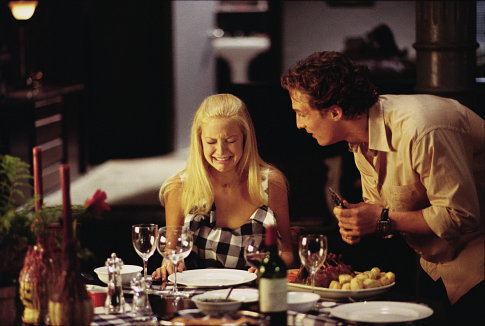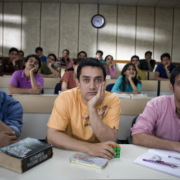One of my favourite movies to watch growing up was Two Weeks’ Notice, starring early 2000s heartthrobs Sandra Bullock and Hugh Grant. It’s a classic rom-com, ‘slightly misogynist boy meets passionate, secretly hopeless romantic girl’. She’s an environmental lawyer who practically works as his babysitter and he’s a billionaire, indecisive, unpleasant, and ridiculously co-dependent. At the time, the movie partly shaped my perception of how adult life works. It wasn’t the only one. Movies like “How to lose a guy in 10 days”, “When Harry Met Sally” and “The Proposal” shaped an entire generation’s perception of life and the effects of that are only just starting to wear off as the last of us transition into adulthood. We’re realising life is not all sunshine and flowers, even if you’re a blonde girl working at a New York City magazine.
Not to say that problematic tropes in movies haven’t always existed. The further back you go, the worse it gets. And the movies that we once considered iconic feel like a mess upon revisitation, with rampant sexual harassment, and racist and homophobic stereotypes among other things. And although times have definitely changed for the better, there are still some problematic tropes that aren’t as obvious, that haunt recent movies, for starters:
Glamourizing misconceptions
We could definitely do without the concept of “The One”. In the age of sexual fluidity and exploration, implying that everyone has that one “soulmate” is arguably narrowminded. Some might find it relatable of course, but when movies go out of their way to show a character especially repulsed by love until suddenly one kiss changes everything, seems a little farfetched. The idea that “you just haven’t met the right one yet” is borderline so toxic to promote. The other side of that coin is also when women mistakenly end up believing they can “fix” problematic men. A problematic trope that seems to be stuck to writers like a leech, is the ‘good girl-bad guy’ trope. What started in the 80s with Grease, has somehow evolved into a cringefest with recent movies like the Kissing Booth and 365 Days.
Disastrous foundations
Another in the list of problematic movie plots, it’s time to bid adieu to the accidental pregnancy trope. It’s just overdone. And getting accidentally knocked up is not an ideal foundation for your relationship. That kid will most likely end up in therapy if you don’t. A lot of movies also tend to glamourize or at the very least normalize relationships that stem from cheating. When the main character gets cheated on, we’re supposed to sympathize with them. But when it’s the main character that cheats, the writers suddenly chalk it up to emotional abuse and lack of love from their partner. Regardless of the context, cheating is not something we should be normalizing.
Manipulating realities
One of my least favourite things about movies, however, has to be the flawless sex scenes. There is no world in which sex is not the most awkward thing you’ve done. Especially when it’s your first time. It’s messy, and sometimes uncomfortable if you don’t know what you’re doing. You could be a self-proclaimed sex guru, but your first time with anyone new will be weird, as you try to navigate an entirely new body. And that’s honestly the fun part. Speaking of manipulating realities, can we do away with the notion that birthing is quick and easy? Movies always show a woman screaming in pain, and then like 30 minutes later, you hear a baby crying. Pregnancy is a lot more complicated than decorating a nursery and bringing home a perfectly polished baby. The process starts months before and doesn’t end the moment a baby pops out. Most movies especially shy away from the after-effects of birth.
Pigeon holes
You would think creators would know better by now, but sadly, characters without any depth are still pretty common. Why can’t a woman who’s a certified badass also be openly hopeless romantic? We always tend to put all the characters in boxes, but humans are so much more complex than that. Women and other minorities especially are victims of this. Mostly these characters exist only to get one single point across. Humans are not this black or white, though. You can in fact absolutely demolish people in Clash of Clans on a Saturday night and be a pilates princess the next morning.
Uprooting your entire life to escape trauma
Instead, you know, maybe get some help? At the very least, maybe box-dye your hair. So many of our favourite movies glamourize running away and turning over a new leaf in face of trouble. Which, if you can do it, good for you! But for many, it’s never that simple. In these films, problems tend to solve themselves for the main character. One day they’re not happy with their life, so the next, they’re in Puerto Rico and they didn’t even drop their two weeks’ notice off. In real life, a lot of factors come into play before you can just up and leave.
Look, it’s understandable that sometimes, we just need to look at movies as moving pictures and not as some deep commentary on life and death. But the point I’m making is not to have realism in films, but rather, relatability and consistency. As we evolve as a society, somewhere our films need to reflect that.





